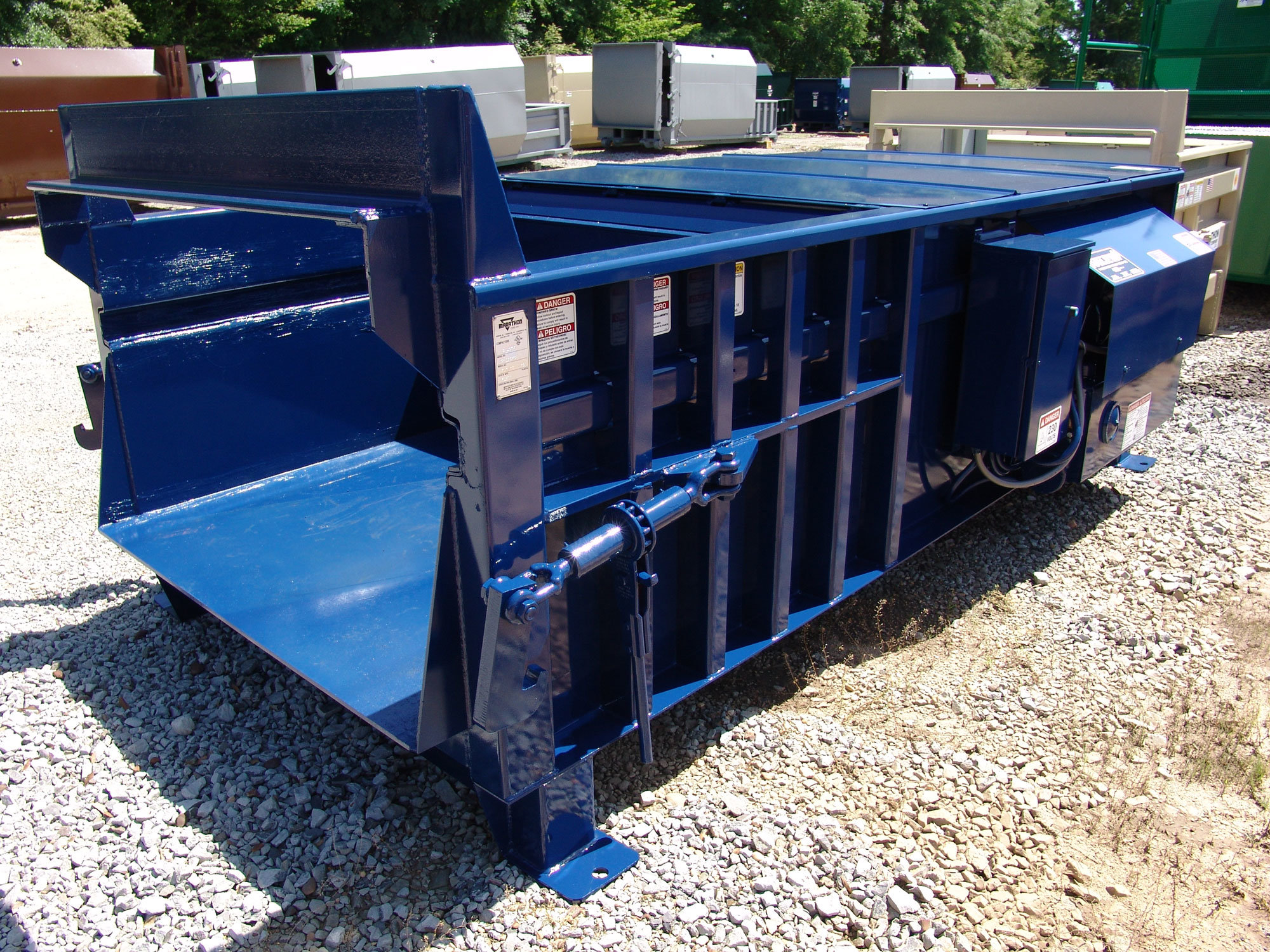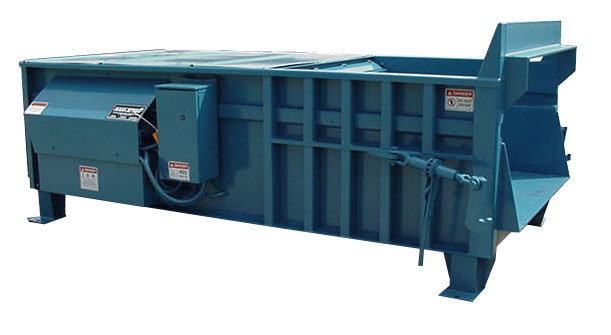Understanding the Different Uses Waste Tools in the Recycling Industry
The recycling market relies greatly on specialized waste tools to maximize processing and recovery. Each device, from shredders to balers, serves an unique function that improves overall efficiency. Recognizing these roles is necessary for enhancing sustainability efforts. Commercial garbage compaction equipment. As innovation breakthroughs, brand-new technologies emerge, promising to transform conventional techniques. This development increases crucial inquiries concerning the future of waste administration and its influence on environmental conservation. What modifications lie ahead for this vital industry?
The Duty of Shredders in Product Processing
Shredders play a crucial duty in the recycling market by effectively processing numerous sorts of waste products. These equipments are developed to minimize huge things, such as plastics, steels, and natural waste, into smaller, workable items. This size decrease is necessary for subsequent recycling processes, as it permits for much easier handling and sorting. In enhancement to helping with recycling, shredders enhance safety by lessening the threat of injury connected with dealing with cumbersome waste products.
Shredders add to ecological sustainability by making certain that products are refined in a way that makes best use of resource healing. They can handle a diverse variety of materials, making them functional devices in waste administration facilities. The reliable operation of shredders not only enhances the recycling procedure however also enhances the general efficiency of waste diversion efforts, promoting a round economic situation. Their importance in product processing can not be overstated, as they act as a fundamental step in the direction of lasting waste management techniques.

Exactly How Balers Enhance Efficiency in Waste Administration
Balers considerably boost efficiency in waste monitoring by compacting various materials right into bundles, which streamlines storage and transportation. By compressing recyclables such as cardboard, plastics, and steels, balers substantially decrease the quantity of waste. This compression not just makes the most of room in reusing centers but additionally reduces the variety of journeys called for to transport products, resulting in lower gas expenses and decreased environmental influence.
In addition, balers contribute to improved security in waste monitoring procedures. Small bales are simpler to manage and pile, lowering the danger of accidents linked with loosened materials. The uniform size of bales permits a lot more reliable filling and unloading procedures, improving procedures within recycling facilities. Additionally, balers can improve the total high quality of recyclables, as correctly compacted products are much less likely to be contaminated. In general, balers play a vital function in optimizing waste monitoring methods, promoting sustainability in the recycling industry.
Conveyor Systems: Improving the Recycling Process
Including sophisticated equipment like balers substantially improves waste management operations, yet the performance of the reusing procedure is even more enhanced via making use of conveyor systems. These systems play a crucial duty in the smooth transport of products within recycling facilities. By assisting in the motion of various waste kinds, conveyor systems decrease manual handling and lower the danger of contamination throughout the reusing procedure.
Furthermore, conveyor systems can be tailored to fit the distinct layouts and functional requirements of recycling centers. Their ability to run constantly permits for a consistent circulation of materials, boosting performance and making sure that refining and arranging devices receives a regular supply.
Outfitted with functions like adjustable rates and automated controls, conveyor systems can maximize the flow the original source of products, greatly boosting overall performance (Commercial garbage compaction equipment). Subsequently, these systems are important in contemporary recycling operations, simplifying processes and contributing to efficient waste monitoring
Sorting Makers: The Secret to Product Recuperation
Sorting equipments are necessary parts in the reusing market, significantly improving the efficiency of product recovery. These machines play a critical function in the splitting up of various recyclable products, permitting a structured process that takes full advantage of resource removal. By making use of sophisticated innovations, such as optical sensing units and air classifiers, sorting makers can recognize and categorize products based upon their dimension, weight, and composition. This capacity guarantees that metals, plastics, and paper items are successfully separated, decreasing contamination and improving the high quality of recycled outcome.
The procedure of sorting equipments considerably minimizes the dependence on manual labor, which can be both prone and taxing to mistakes - Commercial garbage compaction equipment. Furthermore, the automation given by these machines accelerates the overall recycling process, resulting in greater throughput and increased functional efficiency. Subsequently, sorting makers are vital in attaining lasting waste monitoring objectives, making it possible for the reusing sector to efficiently recoup beneficial products while decreasing landfill reliance

Advancements in Waste Devices for a Sustainable Future
Current advancements in waste my latest blog post devices are driving the reusing sector toward a more sustainable future. Technologies such as automated sorting systems, which use expert system and equipment discovering, enhance performance by properly identifying and separating recyclables. This results in greater healing prices and minimized contamination. In addition, developments in condensing modern technology enable much more efficient transportation of products, decreasing carbon impacts throughout transit.
Improvements in shredding tools enhance the handling of intricate products, allowing the recycling of items that were when regarded non-recyclable. The combination of renewable resource resources, like solar energy, in waste handling centers better adds to sustainability objectives. Furthermore, innovations in eco-friendly products and waste-to-energy innovations are improving the landscape of waste management. Jointly, these improvements indicate a transformative change within the reusing industry, advertising not just ecological security yet also economic stability for future generations.
Frequently Asked Inquiries
What Kinds Of Materials Can Waste Equipment Handle?
The sorts of materials waste devices can manage include plastics, steels, paper, glass, and organic waste. Each equipment type is created for specific products, maximizing performance and performance in arranging and processing numerous waste streams.
How Often Should Waste Equipment Be Maintained?

Exist Safety Worry About Using Waste Tools?
Safety and security interest in making use of waste tools consist of potential injuries from mechanical breakdowns, exposure to hazardous materials, and inadequate training. Correct maintenance, routine assessments, and staff member education and learning are necessary to minimize these dangers effectively in any type of setting.
What Is the Ordinary Lifespan of Recycling Equipment?
The ordinary life expectancy of recycling tools usually varies from 10 to two decades, depending upon elements such as use intensity, maintenance methods, and technical advancements, which can significantly influence toughness and performance over time.
How Is Waste Tools Powered in Recycling Facilities?
Waste devices in reusing centers is normally powered by electrical energy, though some machines may make use of alternative energy resources like natural gas or diesel. This power enables efficient handling and transformation of more tips here products for reusing objectives.
Shredders play an essential function in the recycling sector by efficiently refining numerous types of waste materials. They can handle a varied variety of products, making them flexible devices in waste monitoring facilities. Balers greatly boost effectiveness in waste administration by compacting numerous products right into bundles, which streamlines storage space and transport. The kinds of products waste equipment can take care of consist of plastics, metals, paper, glass, and organic waste. Security issues with making use of waste devices consist of possible injuries from mechanical malfunctions, exposure to dangerous products, and inadequate training.